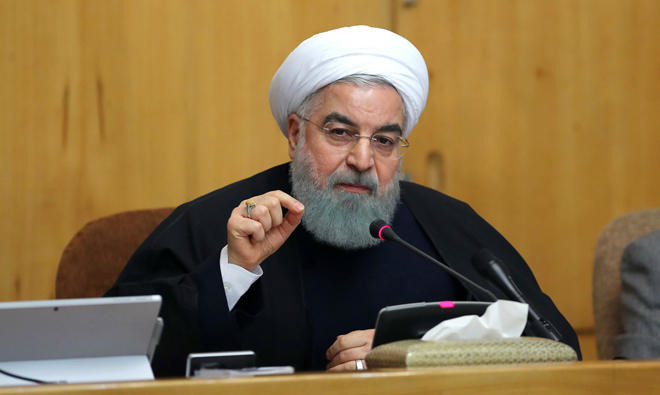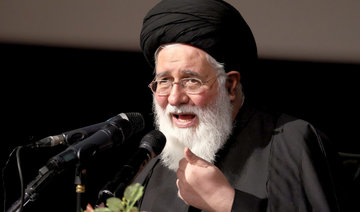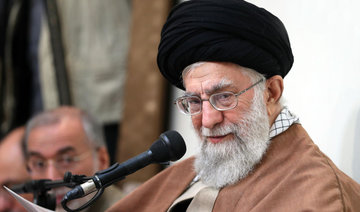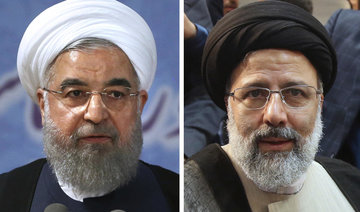DUBAI: Iranian authorities are concerned that nationwide unrest will undermine the clerical establishment and want to stamp out the protests quickly, senior regime officials say. But the person with the most to lose is President Hassan Rouhani.
While several senior officials said there was concern that prolonged unrest would damage the legitimacy and influence of the country’s religious leaders, few insiders see the unrest as an existential threat to that leadership, which has ruled since the 1979 revolution and is now controlled by Supreme Leader Ayatollah Ali Khamenei, the ultimate authority in Iran’s system of dual clerical and republican rule.
The biggest loser, they say, is likely to be Rouhani, who is much more closely tied to the country’s economic policies.
“Of course, Rouhani and his government will have less power afterward, especially because his economic policy was criticized during the unrest,” said political analyst Hamid Farahvashian.
“He will be a lame-duck president and Khamenei will have more power.”
Much of the protesters’ anger has focused on what Rouhani and his government have failed to deliver: An economic boom promised as the payoff for the 2015 deal that curbed Iran’s disputed nuclear program in return for world powers lifting sanctions.
Protesters are angry that Iran’s youth unemployment rate is edging toward 30 percent, want higher wages and an end to alleged graft. They have chanted slogans against all of Iran’s leaders, including the clerical elite, and attacked police vehicles, banks and mosques as the unrest widened.
“The continuation of the protests will lead to a legitimacy crisis,” said one senior official close to Rouhani, asking not to be named due to the sensitivity of the issue.
“People have economic demands... of course these demands should be taken seriously... of course the establishment should listen to the people, but all these can be discussed in a calm atmosphere,” the official said.
Some conservatives have pushed for a hard-line approach, even though bloodshed could fuel more protests in the largest wave of demonstrations since nationwide unrest in 2009.
“So far, security forces have not tried to prevent the demonstrations... but this will change if (Khamenei) calls for an end to the street protests and demonstrators defy his call,” said one former Iranian official from the reformist camp.
Even if the unrest is quelled, the demands of tens of thousands of restless working-class youths who have taken to the streets are unlikely to dissipate.
Khamenei spoke publicly for the first time about the crisis on Tuesday, accusing Iran’s enemies of stirring unrest but saying no more. A statement on his website said he would address the nation about the events “when the time is right.”
The protesters have little chance of toppling the clerical leaders, who appear to be retaining control of the military, police, and security forces and have no compunction about using them, according to one US official following the developments.
Rouhani, who was elected in 2013, is more exposed. He is seen as a pragmatist at odds with Iran’s hard-liners and has said in response to the protests that Iranians have a right to criticize the authorities.
But he has a fight on his hands because of growing resentment over high prices and allegations of corruption.
“His power is limited in Iran’s ruling system. Public discontent is increasing ... people are losing their faith in the establishment system,” a third Iranian official said. “The leaders are well aware of this fact and its dangerous consequences.”
US officials fear the likeliest outcome of the protests is discrediting what one called Rouhani’s “moderate brand of moderation” and a harsher crackdown by the clerical authorities.
“It’s an open question whether Rouhani ever intended to keep any of his promises, but he hasn’t delivered, especially on the economic front, and that means he has no popular support and is expendable to Khamenei,” said a second US official, who spoke on condition of anonymity to discuss intelligence matters.
“He’s likely to be one of the casualties, though maybe not immediately.”
Rouhani has blamed his predecessor and the US, Iran’s long-time adversary, for the economy’s shortcomings.
But his government has also backtracked on planned fuel price rises and promised more jobs.
Rouhani may need to spend more money to create more employment if he is to ease discontent and could risk antagonizing powerful interests if he tries to address allegations of corruption.
His vulnerability and the deep divisions in Iran’s hierarchy have fueled suspicions among some of his sympathizers that conservative rivals may have played a hand in the crisis.
“It was a coup against Rouhani and his achievements ... The aim was to harm Rouhani,” said Saeed Leylaz, a political analyst close to the pro-reform movement.
But a fourth official in Tehran said the nationwide protests had united Iran’s leadership.
“At this point, it is not important whether a political faction initiated the unrest to harm the rival group,” the official said. “The unrest was hijacked by our enemies ... that is why all factions have united to protect the Islamic Republic.”
Iran protests could hurt clerics but Rouhani has most to lose, say insiders
Iran protests could hurt clerics but Rouhani has most to lose, say insiders

Cheers and weeping as Israelis watch Gaza hostages return

They watched as the three women — Romi Gonen, Doron Steinbrecher and Emily Damari — got out of a car in Gaza City and were handed over to Red Cross officials amid a surging crowd that was held back by armed men in camouflaged military gear, with green Hamas headbands.
“I’m excited, I was so nervous, that they would come safe and alive to their mothers’ hands. They were in the hands of terrorists for 471 days, three young women,” said Shay Dickmann, whose cousin was found slain by her Hamas captors in August.
The Israeli military shared video showing their families gathered in what appeared to be a military facility crying out in emotion as they watched footage of the handover to Israeli forces in Gaza before they were brought back into Israel.
Pictures shared by the families showed the three women embracing their mothers at a reception center, with Emily Damari beaming broadly and waving a bandaged hand missing two fingers at family on the other end of a mobile phone video call.
After a nerve-racking morning, waiting to hear whether Damari would be one of the three hostages freed on Sunday, her friends breathed a sigh of relief.
“We didn’t have any sign of life from her for a whole year and this is the first time we are seeing her, and we are seeing her walking on her two feet and we are just waiting here to hug her and say how much we love her,” said Guy Kleinberger.
They were later flown to a hospital in Tel Aviv in a helicopter that Israeli media reported was piloted by the head of the Israeli air force.
“Romi, Doron, Emily,” an entire nation embraces you,” Prime Minister Benjamin Netanyahu said.
UNCERTAINTY SURROUNDING REMAINING HOSTAGES
The release of the three women, the first of 33 hostages due to be freed from Gaza under phase one of the deal, is in exchange for 90 Palestinian prisoners held in Israeli jails.
The hostages were taken in one of the most traumatic episodes in Israel’s history, when Hamas gunmen attacked a string of communities around the Gaza Strip in the early hours of Oct. 7, 2023, killing around 1,200 civilians and soldiers and abducting 251 hostages — men, women, children and elderly.
But amid hope among many Israelis that the six-week ceasefire marks the beginning of the end to the war, there is deep unease about the uncertainty surrounding the remaining 94 hostages still held in the Gaza Strip.
“The ceasefire is something that I hope will work out,” said Tomer Mizrahi, in Sderot, a town in southern Israel within sight of Gaza that was attacked on Oct. 7. “But as I know Hamas, you cannot even trust them one percent.”
Images of Hamas police emerging on to the streets as the ceasefire took effect underscored how far Israel remains from its originally stated war aims of destroying the Islamist group that has ruled in Gaza since 2007.
“I’m torn,” said Dafna Sharabi from Beit Aryeh-Ofarim, a Jewish settlement in the occupied West Bank. “On the one hand there’s a ceasefire to strengthen the forces, to rest from all the madness, on the other, maybe it’s not the time,” she said.
“They should have been eliminated, wiped out,” she said. “My son was on reserve duty for a year over there ... and he sees all the Gazans returning, Hamas returning its forces to all the places he fought in.”
MEN OF MILITARY AGE NOT IN THE DEAL
After 15 months of war, Gaza lies largely in ruins. Israel’s campaign has killed almost 47,000 Palestinians, according to the Palestinian health ministry and displaced most of the two million people who live in the enclave.
But for many in Israel, the war will not be over while Hamas still stands and there have been a series of rallies opposing the ceasefire as a sell-out that abandons men of military age taken captive, who are not in the first batch of 33 hostages.
National Security Minister Itamar Ben-Gvir has already resigned and his fellow hard-liner Bezalel Smotrich has also opposed the deal and said he has been reassured that it is not the end of the war.
The Israel Democracy Institute said its latest Israeli Voice Index, conducted just before the deal was agreed, found 57.5 percent of Israelis in favor of a comprehensive agreement that would see all hostages back in return for ending the war. Twelve percent supported a partial hostage release in return for a temporary ceasefire.
Amid the mix of emotions, for some, a sense of exhaustion outweighed any concerns about the future.
“We have been waiting for this for a long time. We wanted it to be an absolute victory, I hope we get that absolute victory,” said Shlomi Elkayam, who owns a business in Sderot. “There are pros and cons, but in the end we are tired of it all. We are tired and we want everyone here at home.”
UN races to feed one million Gazans after truce

- World Food Programme trying to reach a million people within the shortest possible time
- First WFP trucks entered Gaza through the Kerem Shalom crossing in the south and through the Zikim crossing in the north
ROME: The UN’s World Food Programme said Sunday it was moving full throttle to get food to as many Gazans as possible after border crossings reopened as part of a long-awaited ceasefire deal.
“We’re trying to reach a million people within the shortest possible time,” the WFP’s Deputy Executive Director Carl Skau told AFP, as the Rome-based UN agency’s trucks began rolling into the strip.
“We’re moving in with wheat flour, ready to eat meals, and we will be working all fronts trying to restock the bakeries,” Skau said, adding the agency would attempt to provide nutritional supplements to the most malnourished.
An initial 42-day truce between Israel and Hamas is meant to enable a surge of sorely needed humanitarian aid into the Palestinian territory after 15 months of war.
“The agreement is for 600 trucks a day... All the crossings will be open,” Skau said.
The first WFP trucks entered Gaza through the Kerem Shalom crossing in the south and through the Zikim crossing in the north, the agency said in a statement, as it began trying to pull “the war-ravaged territory back from starvation.”
“We have 150 trucks lined up for every day for the next at least 20 days,” Skau said, adding that the WFP was “hopeful that the border crossings will be open and efficient.”
There needs to be “an environment inside (Gaza) that is secure enough for our teams to move around,” so that food “does not just get over the border but also gets into the hands of the people.”
“It seems so far that things have been working relatively well.... We need to now sustain that over several days over weeks,” he said.
Before the ceasefire came into effect, WFP was operating just five out of the 20 bakeries it partners with due to dwindling supplies of fuel and flour, as well as insecurity in northern Gaza.
“We’re hoping that we will be up and running on all those bakeries as soon as possible,” Skau said, stressing that it was “one of our top priorities” to get bread to “tens of thousands of people each day.”
“It also has a psychological effect to be able to put warm bread into the hands of the people.”
WFP also wants to “get the private sector and commercial goods in there as soon as possible,” he said.
That would mean the UN agency could replace ready meals with vouchers and cash for people to buy their own food “to bring back some dignity” and allow them “frankly to start rebuilding their lives.”
WFP said in a statement that it has enough food pre-positioned along the borders — and on its way to Gaza — to feed over a million people for three months.
Vast areas of Gaza have been devastated by Israel’s retaliatory assault on the territory after the October 7 Hamas attack last year sparked the war.
The attack, the deadliest in Israel’s history, resulted in the deaths of 1,210 people, mostly civilians, according to an AFP tally of Israeli official figures.
Israel’s retaliatory campaign has killed at least 46,913 people, also mostly civilians, according to figures from the Hamas-run territory’s health ministry that the United Nations considers reliable.
Paramilitary attack near besieged Darfur kills 14

- Nearly all of Darfur is now controlled by the paramilitary troops, which has also taken over swathes of the neighboring Kordofan region and much of central Sudan
PORT SUDAN: A paramilitary attack on an area east of North Darfur’s besieged capital El-Fasher has killed 14 Sudanese civilians, activists said on Sunday.
The “treacherous attack” took place in an area “northeastern Um Kadadah in North Darfur state on Saturday,” said the local resistance committee. The group is one of hundreds of volunteer organizations that have coordinated aid across Sudan during 21 months of fighting between the regular army and the paramilitary Rapid Support Forces.
El-Fasher, a city of some 2 million people which has been under siege of the paramilitary troops since May, has seen some of the fiercest fighting of the war as the army battles to keep its last foothold in the vast Darfur region of western Sudan. Nearly all of Darfur is now controlled by the paramilitary troops, which has also taken over swathes of the neighboring Kordofan region and much of central Sudan. The regular army still controls the north and east, while the capital Khartoum and neighboring cities are a battleground between the warring parties.
HIGHLIGHTS
• Nearly all of Darfur is now controlled by the paramilitary troops, which has also taken over swathes of the neighboring Kordofan region and much of central Sudan.
• The regular army still controls the north and east, while the capital Khartoum and neighboring cities are a battleground between the warring parties.
The war in Sudan began in April 2023, and has killed tens of thousands of people and uprooted more than 12 million, creating what the United Nations calls one of the worst humanitarian disasters in recent memory.
Both the army and the paramilitary have been accused of indiscriminately targeting medical facilities and civilians, as well as deliberately attacking residential areas.
Separately, another 12 people died in the past two days in South Sudan in attacks on citizens from northern neighbor Sudan, the country’s security forces reported, despite an overnight curfew.
Demonstrations sparked by reports that 29 South Sudanese had been killed during fighting in Sudan’s Al-Jazeera state led to the looting of businesses owned by Sudanese nationals in the capital Juba.
Police opened fire to disperse the crowd, killing three and wounding seven.
South Sudan security forces said Saturday that nine people — two South Sudanese and seven Sudanese — had been killed during protests Friday in the town of Aweil.
The world’s newest nation had imposed a curfew Friday night as protests spread to other towns.
Italy’s foreign minister to visit Israel, Palestine

- Tajani will stress Italy’s “attention” to “post-war reconstruction in Gaza”
ROME: Italian Foreign Minister Antonio Tajani will visit Israel and Palestinian territories now that a long-awaited ceasefire in Gaza has come into effect, his office said Sunday.
Tajani will travel Monday to “Israel and Palestine” to meet Israeli President Isaac Herzog, Israeli Foreign Minister Gideon Saar and Palestinian Prime Minister Mohammed Mustafa, it said in a statement.
“The entry into force of the agreement offers a historic opportunity for the Israeli people, for the Palestinian people and for the entire region,” Tajani said.
“I will confirm to the Israeli and Palestinian authorities the Italian government’s commitment to alleviate the painful conditions of the civilian population that has suffered so much,” he said.
“Our humanitarian interventions will continue and be further strengthened,” he added.
Tajani will stress Italy’s “attention” to “post-war reconstruction in Gaza.”
He will also co-chair with Israel’s Saar a meeting with the business community “to illustrate investment opportunities between the two countries, within the framework of growth diplomacy initiatives.”
“Investments built with a presence not only in Israel but throughout the region will help stabilize the area,” Tajani said.
Meanwhile, UK foreign office said Britain “welcomes” the expected release of British-Israeli hostage Emily Damari after she was named as one of the three women to be released Sunday under a ceasefire deal.
“The UK government welcomes the reports that British national Emily Damari is on the list of hostages to be released by Hamas today. We stand ready to support her upon her release,” the foreign office said in a statement.
Kuwaiti first deputy prime minister affirms military cooperation with US forces

- Sheikh Fahad Yusuf Saud Al-Sabah met with Lt. Gen. Patrick Frank, commander of US Army Central and Third Army
- The Kuwait Army’s deputy chief and senior officers also joined the visit to Camp Buehring
LONDON: Kuwaiti First Deputy Prime Minister, Minister of Defense and Minister of Interior Sheikh Fahad Yusuf Saud Al-Sabah has visited Camp Buehring to reaffirm the strong military cooperation between his country and the US.
During his visit on Saturday, Sheikh Fahad met with Lt. Gen. Patrick Frank, commander of US Army Central and Third Army, and Karen Hideko Sasahara, US Ambassador to Kuwait.
Sheikh Fahad was briefed on the camp’s tasks and the troops’ preparedness. He also examined operational plans and missions and reaffirmed his commitment to strengthening the training and defense coordination partnership between Kuwait and the US.
Also joining the visit were Deputy Chief of Staff of the Kuwait Army Air Marshal Sheikh Sabah Jaber Al-Ahmad Al-Sabah and other senior officers.


















